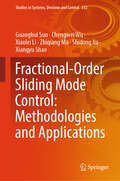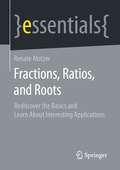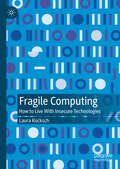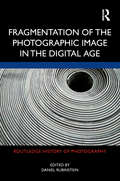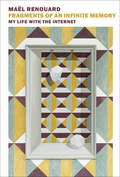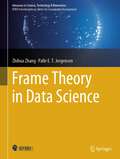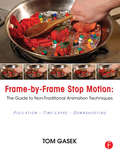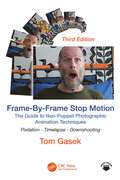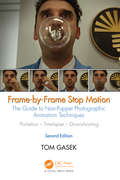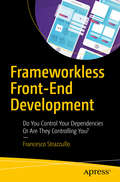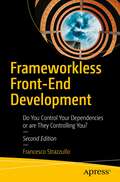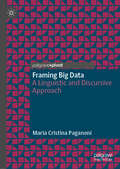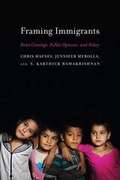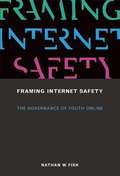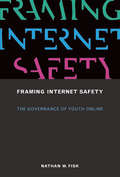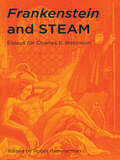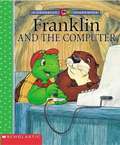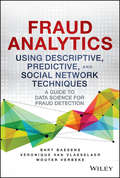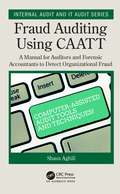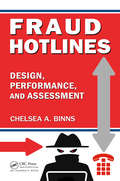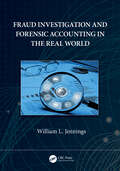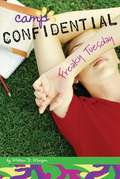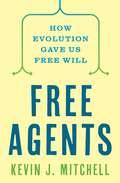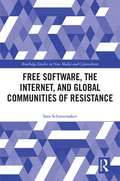- Table View
- List View
Fractional-Order Sliding Mode Control: Methodologies and Applications (Studies in Systems, Decision and Control #532)
by Guanghui Sun Xiaolei Li Chengwei Wu Xiangyu Shao Zhiqiang Ma Shidong XuThis book delves deep into fractional-order control and fractional-order sliding mode techniques, addressing key challenges in the control design of linear motor systems and control for the deployment of space tethered systems. Innovative strategies such as adaptive fractional-order sliding mode control and fractional-order fuzzy sliding mode control schemes are devised to enhance system performance. Divided into three parts, it covers a brief view of fractional-order control strength in modeling and control, fractional-order sliding mode control of linear motor systems, and fractional-order sliding mode control for the deployment of space tethered systems. Each chapter offers valuable insights and solutions. Simulations and experiments validate the efficacy of these approaches, making this book essential for researchers, engineers, and practitioners in control systems and aerospace engineering.
Fractions, Ratios, and Roots: Rediscover the Basics and Learn About Interesting Applications (essentials)
by Renate MotzerRenate Motzer introduces the world of fractions and connects them with decimal numbers. She clearly shows that fractions can be understood as parts of a whole, but also as ratios of two quantities. The author clearly shows why roots cannot be exactly indicated by fractions, how to find good approximations and why an unusual addition of fractions can lead to paradoxical results. Furthermore, she explains the use of fractions in percentage and probability calculations in a practical way and finally discusses different ways of forming mean values.This Springer essential is a translation of the original German 1st edition essentials, Brüche, Verhältnisse und Wurzeln by Renate Motzer, published by Springer Fachmedien Wiesbaden GmbH, part of Springer Nature in 2018. The translation was done with the help of artificial intelligence (machine translation by the service DeepL.com). A subsequent human revision was done primarily in terms of content, so that the book will read stylistically differently from a conventional translation. Springer Nature works continuously to further the development of tools for the production of books and on the related technologies to support the authors.
Fragile Computing: How to Live With Insecure Technologies
by Laura KockschThis book proposes alternative ways to engage with computer security, rooted in Science and Technology Studies (STS) and extensive ethnographic observations. Computer security, the author argues, is part of living in the Anthropocene – an age of damaged more-than-human relations. As such, doing computer security means not striving for technical solutions, or individual awareness, but living with fragility. The book suggests conceptual approaches and methods of studying computer security which contribute to current debates on infrastructural breakdown and ecological ruins in STS and Anthropology, while offering new perspectives to Usable Security and Critical Security Studies.
Fragmentation of the Photographic Image in the Digital Age (Routledge History of Photography)
by Daniel RubinsteinFragmentation of the Photographic Image in the Digital Age challenges orthodoxies of photographic theory and practice. Beyond understanding the image as a static representation of reality, it shows photography as a linchpin of dynamic developments in augmented intelligence, neuroscience, critical theory, and cybernetic cultures. Through essays by leading philosophers, political theorists, software artists, media researchers, curators, and experimental programmers, photography emerges not as a mimetic or a recording device but simultaneously as a new type of critical discipline and a new art form that stands at the crossroads of visual art, contemporary philosophy, and digital technologies.
Fragments of an Infinite Memory: My Life with the Internet
by Mael RenouardA deeply informed, yet playful and ironic look at how the internet has changed human experience, memory, and our sense of self, and that belongs on the shelf with the best writings of Roland Barthes and Jean Baudrillard.&“One day, as I was daydreaming on the boulevard Beaumarchais, I had the idea—it came and went in a flash, almost in spite of myself—of Googling to find out what I&’d been up to and where I&’d been two evenings before, at five o&’clock, since I couldn&’t remember on my own.&” So begins Maël Renouard&’s Fragments of an Infinite Memory, a provocative and elegant inquiry into life in a wireless world. Renouard is old enough to remember life before the internet but young enough to have fully accommodated his life to the internet and the gadgets that support it. Here this young philosopher, novelist, and translator tries out a series of conjectures on how human experience, especially the sense of self, is being changed by our continual engagement with a memory that is impersonal and effectively boundless. Renouard has written a book that is rigorously impressionistic, deeply informed historically and culturally, but is also playful, ironic, personal, and formally adventurous, a book that withstands comparison to the best of Roland Barthes and Jean Baudrillard.
Frame Theory in Data Science (Advances in Science, Technology & Innovation)
by Zhihua Zhang Palle E. JorgensenThis book establishes brand-new frame theory and technical implementation in data science, with a special focus on spatial-scale feature extraction, network dynamics, object-oriented analysis, data-driven environmental prediction, and climate diagnosis. Given that data science is unanimously recognized as a core driver for achieving Sustainable Development Goals of the United Nations, these frame techniques bring fundamental changes to multi-channel data mining systems and support the development of digital Earth platforms. This book integrates the authors' frame research in the past twenty years and provides cutting-edge techniques and depth for scientists, professionals, and graduate students in data science, applied mathematics, environmental science, and geoscience.
Frame by Frame Stop Motion: NonTraditional Approaches to Stop Motion Animation
by Tom GasekIn a world that is dominated by computer images, alternative stop motion techniques like pixilation, time-lapse photography and down-shooting techniques combined with new technologies offer a new, tangible and exciting approach to animation. With over 25 years professional experience, industry veteran, Tom Gasek presents a comprehensive guide to stop motion animation without the focus on puppetry or model animation. With tips, tricks and hands-on exercises, Frame by Frame will help both experienced and novice filmmakers get the most effective results from this underutilized branch of animation. Practical insight and inspiration from leading filmmakers like PES (Western Spaghetti Creator, Time Magazine's #2 Viral Video of 2008), Dave Borthwick, of the Bolex Brothers and more! The accompanying website will include further content driven examples, indexes of stop motion software, a recommended film list and tools and resources for the beginner and intermediate stop motion artist, animators and filmmakers.
Frame-By-Frame Stop Motion: The Guide to Non-Puppet Photographic Animation Techniques
by Tom GasekThis third edition of Frame‑by‑Frame Stop Motion is an up‑to‑date review of non‑puppet stop motion techniques. The reader will not only learn how to execute these techniques through descriptive chapters but also experience them with the carefully designed exercises included at the end of this book. There are many other aspects of filmmaking including design, sound, cinematography, lighting, and animation principles that make this a thorough study in non‑puppet stop motion. The animation of people, objects (not designed to be animated), light painting, time‑lapse, and downshooting are popular approaches to animation practice around the globe. This edition includes insights from the author, an experienced stop motion puppet and non‑puppet animator, as well as filmmakers from Japan to Eastern Europe to Argentina and North America. There are many aspects to this edition that should appeal not only to animators but also to photographers, live‑action filmmakers and those interested in expanding their repertoire in the filmmaking arena. Included are examples of filmmaking critiques and a wide variety of applications of photographic animation. Frame‑by‑Frame Stop Motion is the only resource of its kind.
Frame-By-Frame Stop Motion: The Guide to Non-Puppet Photographic Animation Techniques, Second Edition
by Tom GasekSingle frame film-making has been around as long as film itself. It is the ancestor to modern day special effects and animation. Despite its age-old practice, Single frame film making and stop-motion animation continues to influence media and culture with its magic. Current advances in technology and classic stop motion techniques, such as pixilation, time-lapse photography and down shooting have combined to form exciting new approaches. Tom Gasek’s Frame-By-Frame Stop Motion offers hands-on experience and various tricks, tips, and exercises to help strengthen skills and produce effective results. Interviews from experts in the field offer not only offer inspiration but also help readers learn how to apply skills and new applications. The companion website offers further instruction, recommended films, tools and resources for the both the novice and the expert. Key Features Features interviews with industry experts that offer inspiration and insight as well as detailed explanations of the inner workings of non-traditional stop motion techniques, processes, and workflows Applies professional stop motion techniques that have been taught and refined in the classroom and applied to leading stop motion films, exhibiting at South By Southwest, Cannes, and more Explores the stop motion opportunities beyond model rigs and puppetry. Re-visualizes stop motion character movements, build downshooter rigs, and configures digital workflows with After Effect tutorials while creating dynamic, creative and inspired stop motion films Offers new coverage of smart phones and their application in stop motion Covers motion control, Dragon Frame, evolution of timelapse, expanded light painting, DSLR cameras, and more
Frameworkless Front-End Development: Do You Control Your Dependencies Or Are They Controlling You?
by Francesco StrazzulloExplore an alternative method of front-end application development without using frameworks or third-party libraries. This book provides you with the required skills and freedom to consider a “no framework” approach when choosing a technology for creating a new project.You’ll work through the most important issues in a clear and sensible way, using practical methods and tools to gain an understanding of non-functional requirements. This book answers questions on important topics such as state management, making a routing system, creating a REST client using fetch, and reveals the trade-offs and risks associated with choosing the wrong framework or tool for your project, as well as providing sustainable, functional alternatives.Frameworkless Front-End Development breaks down the concept of technical debt and the ways in which a framework can impact the lifespan of a project. Along with gaining a comprehensive and clear guide on coding effectively from scratch without frameworks, you will also learn some principles of technical decision-making. What You'll Learn Review how DOM manipulation worksManage the state of a front-end application with different patternsSafely migrate existing applications to a new framework or to frameworkless codeUse decision-making tools such as a Framework Compass Chart and an Architectural ClashSee how the choice of frameworks can affect the ‘health’ and lifespan of a codebase Who This Book Is For JavaScript developers; technical managers responsible for helping teams choose technology stacks for new projects; consultants intending to refactor existing JavaScript front-end codebases
Frameworkless Front-End Development: Do You Control Your Dependencies or are They Controlling You?
by Francesco StrazzulloExplore an alternative method of front-end application development without using frameworks or third-party libraries. This updated book provides you with the required skills and freedom to consider a “no framework” approach when choosing a technology for creating a new project. New topics covered include a brief history of JavaScript frameworks and their key developments, how to protect domain code, and how to work with frameworkless in legacy applications.You’ll work through the most important issues in a clear and sensible way, using practical methods and tools to gain an understanding of non-functional requirements. This book answers questions on important topics such as state management, making a routing system, creating a REST client using fetch, and reveals the trade-offs and risks associated with choosing the wrong framework or tool for your project, as well as provides sustainability, and functional alternatives.Frameworkless Front-End Development breaks down the concept of technical debt and the ways in which a framework can impact the lifespan of a project. Along with gaining a comprehensive and clear guide on coding effectively from scratch without frameworks, you will also learn some principles of technical decision-making.What You’ll LearnUnderstand DOM manipulation Manage the state of a fronted application with different patternsSafely migrate existent applications to a new framework or to frameworkless codeUnderstand the importance of non-functional requirementsSee how a Framework can affect the “health” of a codebaseWho This Book Is For Skilled JavaScript developers who want to understand how to effectively write code without using dependenciesCTOs who need to help teams to choose a technology stack for their next projectConsultants that need to refactor an existent JavaScript front-end codebase
Framing Big Data: A Linguistic and Discursive Approach
by Maria Cristina PaganoniThis book addresses big data as a socio-technical construct with huge potential for innovation in key sectors such as healthcare, government and business. Big data and its increasingly widespread use in such influential spheres can generate ethically controversial decisions, including questions surrounding privacy, consent and accountability. This book attempts to unpack the epistemological implications of the term ‘big data’, as well as the opportunities and responsibilities which come with it. The author analyses the linguistic texture of the big data narrative in the news media, in healthcare and in EU law on data protection, in order to contribute to its understanding from the critical perspective of language studies. The result is a study which will be of interest to students and scholars working in the digital humanities, corpus linguistics, and discourse studies.
Framing Immigrants: News Coverage, Public Opinion, and Policy
by S. Karthick Ramakrishnan Chris Haynes Jennifer MerollaWhile undocumented immigration is controversial, the general public is largely unfamiliar with the particulars of immigration policy. Given that public opinion on the topic is malleable, to what extent do mass media shape the public debate on immigration? In Framing Immigrants, political scientists Chris Haynes, Jennifer Merolla, and Karthick Ramakrishnan explore how conservative, liberal, and mainstream news outlets frame and discuss undocumented immigrants. Drawing from original voter surveys, they show that how the media frames immigration has significant consequences for public opinion and has implications for the passage of new immigration policies. The authors analyze media coverage of several key immigration policy issues—including mass deportations, comprehensive immigration reform, and measures focused on immigrant children, such as the DREAM Act—to chart how news sources across the ideological spectrum produce specific “frames” for the immigration debate. In the past few years, liberal and mainstream outlets have tended to frame immigrants lacking legal status as “undocumented” (rather than “illegal”) and to approach the topic of legalization through human-interest stories, often mentioning children. Conservative outlets, on the other hand, tend to discuss legalization using impersonal statistics and invoking the rule of law. Yet, regardless of the media’s ideological positions, the authors’ surveys show that “negative” frames more strongly influence public support for different immigration policies than do positive frames. For instance, survey participants who were exposed to language portraying immigrants as law-breakers seeking “amnesty” tended to oppose legalization measures. At the same time, support for legalization was higher when participants were exposed to language referring to immigrants living in the United States for a decade or more. Framing Immigrants shows that despite heated debates on immigration across the political aisle, the general public has yet to form a consistent position on undocumented immigrants. By analyzing how the media influences public opinion, this book provides a valuable resource for immigration advocates, policymakers, and researchers.
Framing Internet Safety: The Governance of Youth Online
by Nathan W. FiskSince the beginning of the Internet era, it has become almost impossible to discuss youth and technology without mentioning online danger -- pornography that is just a click away, lurking sexual predators, and inescapable cyberbullies. In this book, Nathan Fisk takes an innovative approach to the subject, examining youth Internet safety as a technology of governance -- for information technologies and, by extension, for the forms of sociality and society they make possible. He argues that it is through the mobilization of various discourses of online risk that the everyday lives of youth are increasingly monitored and policed and the governing potentials of information technologies are explored. Fisk relates particular panics over youth Internet safety to patterns of technological adoption by young people, focusing on the policy response at the federal level aimed at producing future cybercitizens. He describes pedagogies of surveillance, which position parents as agents of surveillance; the evolution of the youth Internet safety curricula, as seen through materials on cyberbullying and online reputation management; and, drawing on survey results and focus groups, parent and child everyday practice. Finally, Fisk offers recommendations for a "cybersafety of everyday life," connecting youth Internet safety to trends in national infrastructure protection and corporate information assurance.
Framing Internet Safety: The Governance of Youth Online (The John D. and Catherine T. MacArthur Foundation Series on Digital Media and Learning)
by Nathan W. FiskAn examination of youth Internet safety as a technology of governance, seen in panics over online pornography, predators, bullying, and reputation management.Since the beginning of the Internet era, it has become almost impossible to discuss youth and technology without mentioning online danger—pornography that is just a click away, lurking sexual predators, and inescapable cyberbullies. In this book, Nathan Fisk takes an innovative approach to the subject, examining youth Internet safety as a technology of governance—for information technologies and, by extension, for the forms of sociality and society they make possible. He argues that it is through the mobilization of various discourses of online risk that the everyday lives of youth are increasingly monitored and policed and the governing potentials of information technologies are explored. Fisk relates particular panics over youth Internet safety to patterns of technological adoption by young people, focusing on the policy response at the federal level aimed at producing future cybercitizens. He describes pedagogies of surveillance, which position parents as agents of surveillance; the evolution of the youth Internet safety curricula, as seen through materials on cyberbullying and online reputation management; and, drawing on survey results and focus groups, parent and child everyday practice. Finally, Fisk offers recommendations for a “cybersafety of everyday life,” connecting youth Internet safety to trends in national infrastructure protection and corporate information assurance.
Frank Kane's Taming Big Data with Apache Spark and Python
by Frank KaneFrank Kane's hands-on Spark training course, based on his bestselling Taming Big Data with Apache Spark and Python video, now available in a book. Understand and analyze large data sets using Spark on a single system or on a cluster. About This Book • Understand how Spark can be distributed across computing clusters • Develop and run Spark jobs efficiently using Python • A hands-on tutorial by Frank Kane with over 15 real-world examples teaching you Big Data processing with Spark Who This Book Is For If you are a data scientist or data analyst who wants to learn Big Data processing using Apache Spark and Python, this book is for you. If you have some programming experience in Python, and want to learn how to process large amounts of data using Apache Spark, Frank Kane's Taming Big Data with Apache Spark and Python will also help you. What You Will Learn • Find out how you can identify Big Data problems as Spark problems • Install and run Apache Spark on your computer or on a cluster • Analyze large data sets across many CPUs using Spark's Resilient Distributed Datasets • Implement machine learning on Spark using the MLlib library • Process continuous streams of data in real time using the Spark streaming module • Perform complex network analysis using Spark's GraphX library • Use Amazon's Elastic MapReduce service to run your Spark jobs on a cluster In Detail Frank Kane's Taming Big Data with Apache Spark and Python is your companion to learning Apache Spark in a hands-on manner. Frank will start you off by teaching you how to set up Spark on a single system or on a cluster, and you'll soon move on to analyzing large data sets using Spark RDD, and developing and running effective Spark jobs quickly using Python. Apache Spark has emerged as the next big thing in the Big Data domain – quickly rising from an ascending technology to an established superstar in just a matter of years. Spark allows you to quickly extract actionable insights from large amounts of data, on a real-time basis, making it an essential tool in many modern businesses. Frank has packed this book with over 15 interactive, fun-filled examples relevant to the real world, and he will empower you to understand the Spark ecosystem and implement production-grade real-time Spark projects with ease. Style and approach Frank Kane's Taming Big Data with Apache Spark and Python is a hands-on tutorial with over 15 real-world examples carefully explained by Frank in a step-by-step manner. The examples vary in complexity, and you can move through them at your own pace.
Frankenstein and STEAM: Essays for Charles E. Robinson
by Brian Bates Susan J. Wolfson Mark A. McCutcheon Lisa Crafton Siobhan Watters Lisbeth Chapin L. Adam Mekler Robin HammermanCharles E. Robinson, Professor Emeritus of English at The University of Delaware, definitively transformed study of the novel Frankenstein with his foundational volume The Frankenstein Notebooks and, in nineteenth century studies more broadly, brought heightened attention to the nuances of writing and editing. Frankenstein and STEAM consolidates the generative legacy of his later work on the novel's broad relation to topics in science, technology, engineering, arts, and mathematics (STEAM). Seven chapters written by leading and emerging scholars pay homage to Robinson's later perspectives of the novel and a concluding postscript contains remembrances by his colleagues and students. This volume not only makes explicit the question of what it means to be human, a question Robinson invited students and colleagues to examine throughout his career, but it also illustrates the depth of the field and diversity of those who have been inspired by Robinson's work. Frankenstein and STEAM offers direction for continuing scholarship on the intersections of literature, science, and technology. Published by the University of Delaware Press. Distributed worldwide by Rutgers University Press.
Franklin and the Computer
by Paulette BourgeoisFranklin is totally into Beaver's new computer game, Dam Builders. He keeps popping up at her house and spends all his time playing Dam Builders. He's so obsessed with reaching the next level in the game that he turns down Beaver's invitation to go swimming and even forgets his promise to Bear to show up for soccer practice--twice. One day Franklin finds himself alone; all his friends are at the pond. They are glad when Franklin joins them for a real game of dam builders, and Franklin realizes that friends are the most fun of all. Picture descriptions added.
Fraud Analytics Using Descriptive, Predictive, and Social Network Techniques
by Bart Baesens Veronique Van Vlasselaer Wouter VerbekeDetect fraud earlier to mitigate loss and prevent cascading damage Fraud Analytics Using Descriptive, Predictive, and Social Network Techniques is an authoritative guidebook for setting up a comprehensive fraud detection analytics solution. Early detection is a key factor in mitigating fraud damage, but it involves more specialized techniques than detecting fraud at the more advanced stages. This invaluable guide details both the theory and technical aspects of these techniques, and provides expert insight into streamlining implementation. Coverage includes data gathering, preprocessing, model building, and post-implementation, with comprehensive guidance on various learning techniques and the data types utilized by each. These techniques are effective for fraud detection across industry boundaries, including applications in insurance fraud, credit card fraud, anti-money laundering, healthcare fraud, telecommunications fraud, click fraud, tax evasion, and more, giving you a highly practical framework for fraud prevention. It is estimated that a typical organization loses about 5% of its revenue to fraud every year. More effective fraud detection is possible, and this book describes the various analytical techniques your organization must implement to put a stop to the revenue leak. Examine fraud patterns in historical data Utilize labeled, unlabeled, and networked data Detect fraud before the damage cascades Reduce losses, increase recovery, and tighten security The longer fraud is allowed to go on, the more harm it causes. It expands exponentially, sending ripples of damage throughout the organization, and becomes more and more complex to track, stop, and reverse. Fraud prevention relies on early and effective fraud detection, enabled by the techniques discussed here. Fraud Analytics Using Descriptive, Predictive, and Social Network Techniques helps you stop fraud in its tracks, and eliminate the opportunities for future occurrence.
Fraud Auditing Using CAATT: A Manual for Auditors and Forensic Accountants to Detect Organizational Fraud (Internal Audit and IT Audit)
by Shaun AghiliThis book discusses various common occupational and organizational fraud schemes, based on the Association of Certified Fraud Examiners (ACFE) fraud tree and assist fraud examiners and auditors in correctly choosing the appropriate audit tests to uncover such various fraud schemes. The book also includes information about audit test red flags to watch out for, a list of recommended controls to help prevent future fraud related incidents, as well as step-by-step demonstrations of a number of common audit tests using IDEA® as a CAATT tool.
Fraud Hotlines: Design, Performance, and Assessment
by Chelsea A. BinnsThis book provides a complete guide on fraud hotlines. It is designed to educate readers with respect to the history, purpose, operation, use and utility of fraud hotlines. It also equips readers with the knowledge to create, analyze and assess the performance of fraud hotlines.
Fraud Investigation and Forensic Accounting in the Real World
by William L. JenningsThis book covers every aspect of forensic accounting, anti-fraud control systems, and fraud investigations. The author uses his own case experience to guide the reader through each phase of a forensic accounting assignment and fraud investigation. The book opens with an explanation of what happened to a company that was ensnared in a huge commodity purchasing scheme. Using his knowledge and experience gained over 40 years, the author illustrates that unexpected fraud occurrences can happen to any company, in any industry. Additionally, the author explains the current white-collar crime threats that organizations face every day, as well as legal issues that are often implicated in forensic accounting and fraud investigation projects. Electronic and non-electronic evidence gathering is also covered in detail with illustrative examples. One chapter is devoted entirely to the often misunderstood, but extremely important, subject of witness interviews. It provides the correct approach to the analysis and correlation of evidence in determining findings and conclusions of an investigation. Another chapter is devoted to proper report writing. The author provides detailed guidance on presenting findings to a variety of audiences, including management, a board, law enforcement, and at trials and hearings. It also covers proper techniques for measuring economic damages and concludes with a useful index. William L. Jennings is a Senior Director at Delta Consulting Group. He is responsible for providing forensic accounting, investigation, and asset recovery services to corporations, government agencies, attorneys, and their clients, as well as business controls consulting services to organizations. With more than 40 years of experience in public accounting and auditing, forensic accounting, business valuation, investigation, asset recovery, and business controls development, Mr. Jennings has worked on hundreds of forensic accounting and investigation assignments and he provides expert testimony.
Freaky Tuesday (Camp Confidential #17)
by Melissa J. MorganBrynn's just transferred to a brand-new school in a town close by. A town in Bizarro World, that is, where academic excellence is the fast track to popularity and Candace yes, quiet, seemingly insecure Candace is the reigning queen bee.
Free Agents: How Evolution Gave Us Free Will
by Kevin J. MitchellAn evolutionary case for the existence of free willScientists are learning more and more about how brain activity controls behavior and how neural circuits weigh alternatives and initiate actions. As we probe ever deeper into the mechanics of decision making, many conclude that agency—or free will—is an illusion. In Free Agents, leading neuroscientist Kevin Mitchell presents a wealth of evidence to the contrary, arguing that we are not mere machines responding to physical forces but agents acting with purpose.Traversing billions of years of evolution, Mitchell tells the remarkable story of how living beings capable of choice arose from lifeless matter. He explains how the emergence of nervous systems provided a means to learn about the world, granting sentient animals the capacity to model, predict, and simulate. Mitchell reveals how these faculties reached their peak in humans with our abilities to imagine and to be introspective, to reason in the moment, and to shape our possible futures through the exercise of our individual agency. Mitchell&’s argument has important implications—for how we understand decision making, for how our individual agency can be enhanced or infringed, for how we think about collective agency in the face of global crises, and for how we consider the limitations and future of artificial intelligence.An astonishing journey of discovery, Free Agents offers a new framework for understanding how, across a billion years of Earth history, life evolved the power to choose, and why it matters.
Free Software, the Internet, and Global Communities of Resistance: Hacking the Global (Routledge Studies in New Media and Cyberculture)
by Sara SchoonmakerThis book explores software's pivotal role as the code that powers computers, mobile devices, the Internet, and social media. Creating conditions for the ongoing development and use of software, including the Internet as a communications infrastructure, is one of the most compelling issues of our time. Free software is based upon open source code, developed in peer communities as well as corporate settings, challenging the dominance of proprietary software firms and promoting the digital commons. Drawing upon key cases and interviews with free software proponents based in Europe, Brazil and the U.S., the book explores pathways toward creating the digital commons and examines contemporary political struggles over free software, privacy and civil liberties on the Internet that are vital for the commons' continued development.
